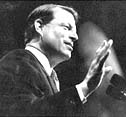
Movie Guru Rating:

Comment
on this review
| |

Election 2000 follows in a grand tradition
by Jesse Fox Mayshark
I wasn't looking forward to Election 2000. I don't like sequels in general, and the last chapter in this particular franchise (the unfocused, cynical Election '96) suggested it was running short on both ideas and energy. But the latest multi-million-dollar installment opened last week to a strong box office, and it's a surprisingly affecting effort.
Of course, it has some of the formulaic flaws of any late-chapter addition to a series. Like the Rocky films, the Election dramas typically pit two unlikely adversaries against each other, building up their backstories and tossing in a scandal or two at key points as the candidates vie for the affection of the electorate and a seat in the Oval Office. But to their credit, the scripters of Election 2000 have thrown out large parts of their tired template and come up with some genuinely fresh twists.
It doesn't seem promising at first. We're re-introduced to Vice President Al Gore (Albert Gore, Jr.) as he begins his bid to succeed his colorful boss, President Bill Clinton (William Jefferson Clinton). But while Gore was an effective sidekick in the last two Elections, providing an endearingly stiff straight man to Clinton's roguish glad-hander, he seems adrift in the lead role. Clinton turns up briefly, but the writers have concocted a conveniently timed crisis in the Middle East to take him out of the country for much of the campaign, and there are also allusions to a sex scandal (never clearly defined, although there are some cheap-joke semen references—de rigeur, apparently, in post-Something About Mary Hollywood) that gives Gore a reason to distance himself from the president.
Unfortunately, Gore's motives for just about everything else remain fuzzy throughout. We know he wants to be president, because he tells us so in every scene, but we're never sure exactly why. Gore strains and grimaces within the constricts of his stilted dialogue and oddly inflexible suits (he reminded me of the Tin Man of Oz), but he suffers from a lack of character development.
His opponent has problems of a different nature. His name is George Bush (George W. Bush), and if that sounds familiar, it's because he's the eldest son of the incumbent president Clinton defeated in Election '92. This, of course, sets up the potential for drama on a classic scale, with the heir seeking to avenge the defeat of his father and restore his family to its rightful place. As if that weren't enough, Bush is something of a prodigal son, a ne'er-do-well who came to politics late in life after years of carousing and cashing in on his prestigious name. The parallels to Henry V are obvious and probably intentional.
Sadly, the actor seems unsuited to the part. The script makes much of his "likability," the ease with which he communicates with everyday folks, but it never really gels. Bush looks nervous when he's supposed to seem casual, and aloof when he's supposed to be empathetic; he has caged-ferret eyes and a jeering smile that suggests self-satisfaction rather than good humor. It doesn't help that the script gives him peculiarly incoherent dialogue. Unlike, say, Michael Douglas in The American President or Martin Sheen on The West Wing, Bush inspires more incredulity than confidence.
There are various efforts at satire in the plot, some more successful than others. Having apparently tired of true tawdriness in the last two Elections, the writers this time send up the whole idea of scandals with some jabs at the media. Desperate for anything juicy out of such calculatedly dull candidates, journalists begin to seize on a comical series of inconsequential misstatements by Gore (e.g. that he "invented the Internet") as evidence of a deep moral flaw. Likewise, an early focus on Bush's youthful drug use presages a last-minute revelation of a past drunk driving offense—which the gin-soaked press corps rallies to with cries of "Shocked! Shocked!"
None of that is enough to make the campaign itself particularly interesting. There's an ill-advised nod toward piety when Gore picks a Connecticut Jew (Joe Lieberman) as his running mate. Lieberman natters on incessantly about spirituality, and then convenes congressional hearings on the moral content of video games—it's not clear if this is intended as a McCarthy send-up or a ham-handed stab at sincerity. There are some "third party" candidates on the fringes, but an aging '60s-era activist (played in an almost bored monotone by Ralph Nader) doesn't get enough screen time to register, and a thuggish Fundamentalist xenophobe (a self-promotional turn by Nixon speechwriter Pat Buchanan) is just a Nazi cartoon. I'm surprised they didn't give him a German accent. I dearly missed the loony H. Ross Perot, who peppered the last two Elections with bursts of absurdist humor. (Former wrestler Jesse Ventura does provide a few chuckles in a cameo as a Midwestern governor. Maybe they should have him run the next time around.)
But just when I'd pretty much given up on the whole thing, the plot turns 180 degrees at the end. I won't give away the twist, but it manages to put the rest of the storyline into an entirely different perspective. Out of a pallid showdown between two uninspired contenders, we get unexpected revelations about the world we've made and the significance of our individual decisions. What starts out seeming like an indictment of the weaknesses of democracy ends up as a celebration of its strengths.
Granted, the scenario is as unlikely as it is imaginative, but it somehow gets by on sheer conviction. It's as hopelessly contrived as Jimmy Stewart's filibuster in Mr. Smith Goes to Washington and just as shamelessly effective. I didn't expect to say this going in, but Election 2000 left me waiting hopefully—if foolishly—for Election 2004.

November 16, 2000 * Vol. 10, No. 46
© 2000 Metro Pulse
|